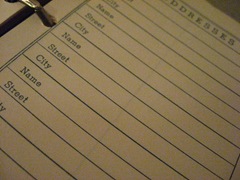Yesterday I had a bit of a scare. Some people rather important to me left my apartment in a car, and we’d had a big snowstorm this weekend. I didn’t know how good the roads were, and when I called them to ask about something trivial a few minutes later, none of them answered their cell phones. I started to panic and dire scenarios rushed through my head.
Finally one of them picked up his phone, and everything was fine – they just had their phones on silent or out of reach! But during my panic when my imagination was running wild, I realized I didn’t have emergency contact numbers for any of them, and they were the people I would call to get those numbers for each other!
I have a paper address book with all of my emergency contacts in it somewhere, but I don’t know where it is, and I know it’s terribly out of date. After my little panic attack this morning, I’m planning to update it. But emergencies aren’t the only reason you ought to have a paper backup of your numbers.
Your phone might break. If you’re relying on your cell phone to store all of the numbers you call, you might encounter a rude awakening at some point. I did, my sophomore year of college. The screen on my cell phone busted, leaving me without the internal address book, caller ID, or text messaging.
I suddenly realized how many people I called daily without knowing their phone numbers! I had to spend that week making a paper backup that I carried in my wallet just to make phone calls. I still have that same piece of paper in my wallet now, just in case.
Backups of backups. Since the invention of the annoying “I lost my phone and need all of your phone numbers!” Facebook group, cell phone companies realized that backing up contact lists was important. But even an electronic backup can fail, or not be accessible when you need it. For some of them, this is as simple as printing out the electronic backup list every so often.
Addresses. I don’t know about you, but I’ve got a lot of people’s phone numbers… but not so many physical addresses on file. Every time I need to mail something to a friend or family member, I have to hunt down their address through Facebook, a mutual friend, or asking the person directly.
Emergencies. Feel free to run through the nightmare scenarios in your head yourself — I’ve hit my quota of those this week already! Basically, relying solely on electronic information storage can be really bad if the power is out when you need that information most.
Address books are cheap — most dollar stores have them, or you could print your own sheets and just use a binder you have laying around. But here’s my big tip for keeping a paper address book: Write in pencil. People change addresses and phone numbers all the time, so instead of crossing things out or keeping the White-Out companies in business by yourself, just write in pencil so you can change it later.
